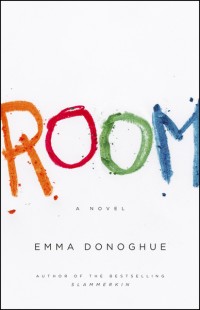25 Points: Room
 Room
Room
by Emma Donoghue
Little, Brown, 2012
384 pages / $7.99 buy from Amazon
1. Not many authors could write believably from a child’s point of view and still provide such credibility and license to the narrator. That’s what you need to know most readily to begin this book.
2. Concepts like “TV People” and rain being nothing more than a blurry veil over Skylight–a saddening slap in the face realization for readers that this is really happening.
3. It is striking, the “savant” nature of the little boy – how he can be so well-educated with so few resources, and yet so ill-informed on social protocol and other “real world” mechanisms. It could be argued, though, that he is in many ways better off than a “normal” child.
4. This reviewer recommends reading this book aloud or obtaining an audio copy. Hearing the dialogue between the mother, the child, and Old Nick is especially gripping.
5. It is an incredible struggle not to be angry with Grandma. Grandma’s love for Ma exists but does not inspire.
6. The poem excerpt at the beginning. Yes.
7. The way the child refers to inanimate nouns as personified, proper-nouned entities provides reality to the voice of the child narrator, but also speaks to the attachment any human would have to inanimate things in a situation such as “Room” describes. It’s a very subtle way to calcify the experience for readers.
8. Page 67, “Princess Diana” “Should have worn her seat belt” — one of the funniest sidesteps in conversation throughout the novel, albeit cryptic.
9. The experience of the Indian family and their dog finding Jack in the park elicits severe, literal nausea. For the first time, picturing Jack outside of Room and experiencing what he must look like up next to other humans, other children – pure nausea.
10. There is a distinct failure to understand that radiates through the hospital. As such, the reader will experience a certain kind of rage and a certain kind of advocacy for Ma and Jack. On Donoghue’s merit, this is a great mechanism for roping readers in more tightly, On the other hand, the injustice provokes readers to consider how often and to what degree these situations are marred by “professionals” in our nonfiction world. READ MORE >
August 15th, 2013 / 12:06 pm
Téa Obreht has won the Orange Prize for her debut novel The Tiger’s Wife. She is the youngest winner etc. etc. The other writers on the shortlist were Emma Donoghue, Aminatta Forna, Emma Henderson, Nicole Krauss and Kathleen Winter.
